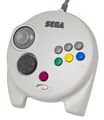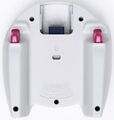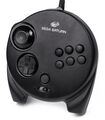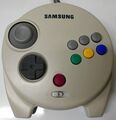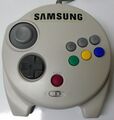Difference between revisions of "3D Control Pad"
From Sega Retro
Scarred Sun (talk | contribs) |
Scarred Sun (talk | contribs) |
||
| Line 4: | Line 4: | ||
| maker=[[Sega]] | | maker=[[Sega]] | ||
| madefor=[[Sega Saturn]] | | madefor=[[Sega Saturn]] | ||
| + | | type=Control pad | ||
| releases={{releasesSat | | releases={{releasesSat | ||
| sat_date_us=1996-08-23{{intref|Press release: 1996-09-11: New 3D "Flight Action" Title Strong Early Indicator For Sega Saturn Fall Sales}} | | sat_date_us=1996-08-23{{intref|Press release: 1996-09-11: New 3D "Flight Action" Title Strong Early Indicator For Sega Saturn Fall Sales}} | ||
| Line 14: | Line 15: | ||
| sat_date_br=199x | | sat_date_br=199x | ||
| sat_date_kr=199x | | sat_date_kr=199x | ||
| − | |||
}} | }} | ||
}} | }} | ||
Revision as of 19:41, 22 July 2019
This short article is in need of work. You can help Sega Retro by adding to it.

| ||||||||||||||||||||||||||||||
| 3D Control Pad | ||||||||||||||||||||||||||||||
|---|---|---|---|---|---|---|---|---|---|---|---|---|---|---|---|---|---|---|---|---|---|---|---|---|---|---|---|---|---|---|
| Made for: Sega Saturn | ||||||||||||||||||||||||||||||
| Manufacturer: Sega | ||||||||||||||||||||||||||||||
| Type: Control pad | ||||||||||||||||||||||||||||||
|
The 3D Control Pad, called the Sega Multi Controller (セガマルチコントローラー) in Japan, Samsung Multi Pad (삼성 멀티패드) in South Korea, and the Joystick 3D in Brazil, is a control pad developed for use with the Sega Saturn. Debuting with NiGHTS into Dreams, it was Sega's answer to the then revolutionary Nintendo 64 controller, which featured an analogue stick as opposed to relying solely on D-Pads.
Analogue sticks generally allow for greater precision in a 3D environment, which in 1996 were becoming more common in the console video game market.
Contents
Hardware
The 3D Control Pad builds on the features already seen in the standard Saturn Control Pad, containing an eight-direcional D-Pad, and ![]() ,
, ![]() ,
, ![]() ,
, ![]() ,
, ![]() ,
, ![]() and START face buttons. New to the controller is an analogue thumbstick (or "3D Directional Pad" as Sega called it), positioned on the left hand side of the controller above the D-Pad. Also inlcuded are analogue
and START face buttons. New to the controller is an analogue thumbstick (or "3D Directional Pad" as Sega called it), positioned on the left hand side of the controller above the D-Pad. Also inlcuded are analogue ![]() and
and ![]() shoulder triggers, a first for mainstream video game controllers.
shoulder triggers, a first for mainstream video game controllers.
To avoid compatibility issues, the analog controller has a switch under the start button to swap between "Digital" and "Analogue" modes. Switching to "Digital" mode disables all analogue settings, essentially turning the controller back into a standard control pad. This switch was vital, because earlier games were not built to understand the analogue technology and will not function correctly if the wrong mode is chosen. The original PlayStation and its latter dual-analogue controllers also required this feature.
The lead can also be removed from the controller for storage purposes.
The 3D Control Pad did not see widespread adoption for the same reason the Sega Saturn failed to capture a large share of the market in the west. The Saturn's 3D output was low, and as the controllers were never bundled with the console, consumers were more familiar with the standard Saturn control pads. It also has some design issues, namely the fact it is quite a lot bigger than most other controllers and arguably less comfortable than the standard pads for certain genres. Even in Japan, where the Saturn was successful, the controller was not used by many games (many of them coming from Sega, though some developers, such as KID, supported it quite a bit (in their case, even after Sega introduced the Dreamcast)).
The 3D Control Pad also works with games compatible with the steering wheel controllers, and the Mission Stick.
List of supported games
- Advanced World War: Sennen Teikoku no Koubou
- Baroque
- Battle Garegga
- Burning Rangers
- Can Can Bunny Extra
- Can Can Bunny Premiere 2
- Choro Q Park
- Christmas NiGHTS into Dreams
- Code R
- Croc: Legend of the Gobbos
- Crypt Killer
- Daisenryaku Strong Style
- Daisuki
- Dark Savior
- Darklight Conflict
- Daytona USA Circuit Edition
- Daytona USA: C.C.E. NetLink Edition
- Daytona USA: Championship Circuit Edition
- Deep Fear
- Die Hard Trilogy
- Duke Nukem 3D
- Enemy Zero
- Fantastep
- Fuusui Sensei
- G Vector
- GT24
- Initial D: Koudou Saisoku Densetsu
- J.League Go Go Goal!
- Jungle Park: Saturn Jima
- Kiss Yori...
- Kuro no Danshou: The Literary Fragment
- Magic Carpet
- Manx TT Super Bike
- NiGHTS into Dreams
- Night Striker S
- Nissan Presents Over Drivin' GT-R
- OoEdo Renaissance
- Panzer Dragoon Saga
- Panzer Dragoon Zwei
- Pia Carrot e Youkoso!!
- Planet Joker
- Powerslave
- Quake
- Sega Ages After Burner II
- Sega Ages Galaxy Force II
- Sega Ages OutRun
- Sega Ages Power Drift
- Sega Ages Vol. 2 Space Harrier
- Sega Ages: Volume 1
- Sega Rally Championship Plus
- Sega Rally Championship Plus NetLink Edition
- Sega Touring Car Championship
- Shining Force III
- Sky Target
- Sonic 3D: Flickies' Island
- Sonic Jam
- Sonic R
- Soukyugurentai
- Soviet Strike
- The House of the Dead
- The Lost World: Jurassic Park (Saturn)
- Thunder Force V
- Touge King the Spirits 2
- Vatlva
- Virtua Cop 2
- Virtuacall S
- Virtual Kyoutei
- Virtual Kyoutei 2
- Wipeout 2097
- World Cup '98 France: Road to Win
History
Development
The 3D Control Pad takes many of its design cues from the XE-1AP, an analog thumbstick controller previously released for the Sega Mega Drive console in 1989, exclusively in Japan.
The 3D Control Pad is one of Sega's most significant video game controllers, with Sega filing a patent covering a number of possible extensions to the design[4], achieved through the port at the top of the controller.
Covered ideas include wireless connections to the console (and light gun-style support)[5], extra joysticks[6] and trackballs[7], memory cards[8], a second display[9], clocks[10], a curious rotatable stand[11] and motion control[12].
Vibration feedback is also considered[13] which may pre-date attempts by Nintendo.
Release
Notably the 3D Control Pad beat the Nintendo 64 to market by a month in the US and several months in Europe, so the Sega Saturn stands as the first video game console to support modern analogue stick support.
Legacy
The 3D Control Pad can be credited for many common features seen in controllers today, with its design greatly influencing that of the Sega Dreamcast Controller. Analogue shoulder buttons have since been adopted by Nintendo, Microsoft and Sony in the Nintendo GameCube, Xbox and PlayStation 3 (and their successors) and the placement of the analogue stick has also been copied by several firms, including Microsoft and Nintendo. Microsoft's Xbox and Xbox 360 controllers in particular borrow a number of design elements from the Dreamcast Controller and Saturn 3D Control Pad.
Magazine articles
- Main article: 3D Control Pad/Magazine articles.
Promotional material
Gallery
Patents
Physical scans
| Saturn, US (NiGHTS into Dreams) |
|---|
| Saturn, EU (NiGHTS into Dreams) |
|---|
| Saturn, JP (NiGHTS into Dreams) |
|---|
| Saturn, JP (Magic Carpet) |
|---|
| Saturn, KR (NiGHTS into Dreams) |
|---|
External links
References
- ↑ Press release: 1996-09-11: New 3D "Flight Action" Title Strong Early Indicator For Sega Saturn Fall Sales
- ↑ Press release: 1996-08-12: $10 million "NiGHTS" launch is largest ever for Sega Saturn
- ↑ 3.0 3.1 http://sega.jp/fb/segahard/ss/multi.html (Wayback Machine)
- ↑ File:Patent US7488254.pdf
- ↑ File:Patent US7488254.pdf, page 11
- ↑ File:Patent US7488254.pdf, page 14
- ↑ File:Patent US7488254.pdf, page 16
- ↑ File:Patent US7488254.pdf, page 18
- ↑ File:Patent US7488254.pdf, page 19
- ↑ File:Patent US7488254.pdf, page 20
- ↑ File:Patent US7488254.pdf, page 21
- ↑ File:Patent US7488254.pdf, page 22
- ↑ File:Patent US7488254.pdf, page 13


